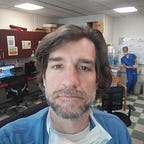Don’t Call Me a Hero
I’m a doctor specializing in hospital medicine. As my colleague put it recently, “You’re the belle of the ball right now.”
A few weeks ago, I was heading to an overnight shift at Mount Sinai Beth Israel, in the East Village in New York City. I drove from my Brooklyn apartment into Manhattan (a 15-minute drive that would normally take an hour) and arrived at 6:55pm. I parked a few blocks from the hospital and walked up.
As I got closer I saw a fire engine. Fuck, I thought, there’s a fire at the hospital! A million ideas went through my head, all the ways that the COVID-19 pandemic could have led to a fire. What kind of chaos was raging?!?
And then I heard the clapping.
Oh! This was that nightly Thank You for healthcare workers!
There was a crowd of a hundred people circled around the hospital. The fire truck had blocked off the street, and everyone was standing there in a semi-circle about 50 feet from the hospital entrance. If I wanted to go inside and start my shift, I would have to push through the crowd and cross that stretch of open asphalt.
I recoiled. For some reason, I strongly did not want to walk across that space in front of everyone. I could imagine them all cheering harder, calling things out: “Thank you for your service!” “Thank you for your sacrifice!”
Now, I am not shy. I do not blush when everyone looks at me. As proof I submit this photo of myself as an actor in high school:
(That’s me as Riff in West Side Story. Later I spent 3 years trying to make it as a professional actor in New York before giving up and going to med school as a miserable failure.)
So let’s be perfectly clear: I love being the center of attention. Normally receiving applause would be 100% my jam.
So what was going on here? Why did I not want to be a part of this?
Something felt weird about this particular applause. And at first I couldn’t put my finger on it.
But I think one reason is that I DID NOT CHOOSE THIS.
I am a doctor. I have a full-time job as a doctor. I am well-paid to do my job.
I am receiving the same salary as before the pandemic. I am expected to show up to work to receive this salary. I would fired — and rightly so — if I just suddenly stopped going to hospital and caring for patients.
So explain to me again how I’m a hero?
I’m not saying I couldn’t be a hero. I like to think that I would be a hero, under different circumstances. But these aren’t those circumstances.
Here’s a situation in which I would a hero:
A super-extra-deadly coronavirus sweeps into New York City. It’s so lethal and contagious that the Governor, the Mayor, and the Health Commissioner hold a joint press conference announcing that no doctor or nurse is expected to show up to work. Every healthcare worker is immediately granted paid leave until the pandemic is over.
Then they ask for volunteers.
In that situation, you could call me a hero for volunteering. If I raised my hand and said Yes, I’m walking into that hospital, even though I don’t have to, then go ahead and applaud me.
If I went in to help strangers and risked my own life, even though I didn’t have to and I wasn’t being paid, then I’ll accept 10 pizzas delivered to my office.
(By the way, thanks for the 10 pizzas, and yes I did eat some. But it still doesn’t make me a hero.)
Honestly, all of this applause and praise feels a little bit like that famous short story The Lottery, where everything is wonderful and happy and bright on the surface. “Yay!” “This is great!” “So exciting!” But all that cheeriness, all that talk of volunteering and altruism hides a dark and disturbing truth.
The truth is that when healthcare workers take care of patients it’s not heroism, it’s not generosity and selfless sacrifice. It’s just people showing up to their job — after their job got a lot more dangerous. They don’t want their job to be dangerous, they’re not happy about it, and they are not selflessly choosing to put themselves at risk to help others.
People have mortgage payments and student loan debt and kids to clothe and feed. You only get that paycheck and pay those bills if you walk into that hospital. Put yourself at risk and keep your job. Or don’t put yourself risk, and lose it. Not very heroic.
